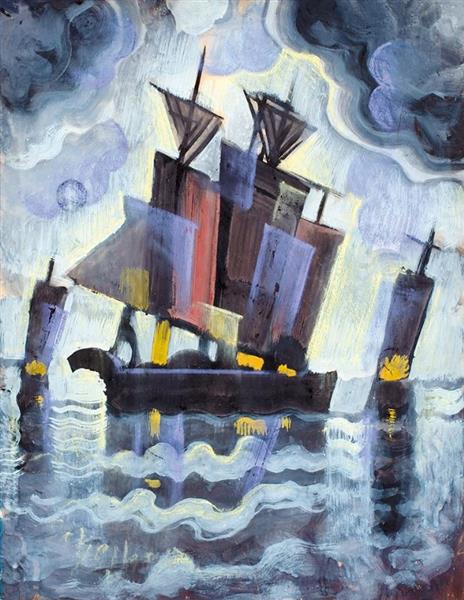Description
Contemplating "Három Vitorlás 1930 - 1930" by Hugó Scheiber is to enter a vibrant visual symphony that captures the essence of urban life dynamism and the symbolic representation of the movement. Scheiber, a prominent Hungarian painter of the twentieth century, joins the current of futurism, and his commitment to the representation of progress and modernity is evident in this particular work.
The paint shows three stylized sailboats that seem to slide over a sea that resembles an amalgam of squares and rectangles, represented in dark and bright tones. The subtle geometrization of the forms and chromatic choice evoke perpetual movement, a fundamental principle in futurism and a recurring element in Scheiber's work. The paint uses a predominantly warm color palette, which highlights the terrible tones and the nuances of red and yellow that give life to the sails of the ships. This selection of colors not only infuses the composition but also provides a visual contrast with the darkest and neutral background, creating a feeling of depth and perspective.
As for the technique, Scheiber uses defined strokes and angular lines that contribute to the sensation of movement inherent in the work. The arrangement of geometric elements and the use of the overlap gives the scene a certain three -dimensionality and vitality. The three sailboats, with their simplified and stylized forms, seem to emerge and at the same time mix with the restless environment of the ocean, perhaps symbolizing the fusion between the nature and the intrusion of man through machinery and technology.
There are no human figures in this work; However, the presence of the sailboats suggests the invisible hand of the human being, guiding and taking advantage of the forces of nature. It is interesting how the absence of characters does not decrease the sense of activity; On the contrary, the focus on the sailboats amplifies the sensation of movement and purpose of the scene. The ships, in their almost abstract appearance, become protagonists, representing not only the physical journey, but also a symbolic journey to the future.
The cultural background of this painting is equally fascinating. In Europe of the early twentieth century, artists such as Hugó Scheiber were looking for new forms of expression and representation, influenced by rapid technological advances and social changes. Scheiber, in particular, found in futuristic art a way to express his vision of movement and time. Although less known than some of his contemporaries, his work is no less significant and "Három Vitorlás 1930 - 1930" is an excellent example of his ability to combine the figurative with the abstract, exploring the limits of perception and representation.
When we meet again with "Három Vitorlás 1930 - 1930", we are invited to reflect on the harmony between man and nature, progress and tradition, and the eternal desire to move towards the unknown. This work is not only a piece of art, but a window to the soul of an era and the innovative vision of Hugó Scheiber.
KUADROS ©, a famous paint on your wall.
Hand-made oil painting reproductions, with the quality of professional artists and the distinctive seal of KUADROS ©.
Art reproduction service with satisfaction guarantee. If you are not completely satisfied with the replica of your painting, we refund your money 100%.

